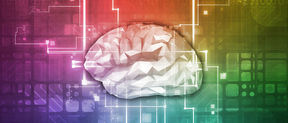Helsinki Brain & Mind utilises digitalisation and develops AI-based brain imaging analysis

From 2019 to 2021, the Helsinki Brain & Mind network established a hub of neuroscience research, competence and innovation in the Helsinki Metropolitan Area, which promotes collaboration between basic research, clinical research, neurotechnology research and development, as well as commercialisation projects in the field.
Collaboration between the University of Helsinki, Aalto University and the Helsinki University Hospital will intensify in the coming years, focusing increasingly on digital development. The European Regional Development Fund will support the network’s new project with more than €700,000 from 2021 to 2023 as part of the measures taken by the European Union due to the Covid-19 pandemic. The overall budget of the project is approximately €885,000.
“The project helps us to accelerate high-quality research and strengthen our cooperation with two universities, a university hospital and businesses. This cooperation makes it possible for us to put to use the strengths of each operator in the development of new digital tools,” says Professor Jari Koistinaho, director of the Neuroscience Center from the University of Helsinki.
AI applications for imaging and safe patient data for data banks
The theme underpinning the new Helsinki Brain & Mind project is digital solutions and innovations that promote brain health. Among other things, the project is aimed at utilising digital brain imaging and combining it with opportunities provided by artificial intelligence solutions.
“We are developing methods based on artificial intelligence, which can be used to analyse extensive brain imaging datasets by automated means and look for characteristics that promote the early diagnosis of brain diseases. The work will be carried out in cooperation with researchers of the Finnish Center for Artificial Intelligence (FCAI),” says Professor Lauri Parkkonen from Aalto University.
The project promotes the development of secure data and analysis environments as well as their utilisation in research and development.
Biobanks constitute one element of data environments. The project’s goal is to survey and create the preconditions for establishing a stem cell repository for brain diseases, a brain scan biobank and a sleep data bank.
“With EEG data from the sleep data bank, we can investigate how the macro- and microstructures of sleep vary in connection with brain diseases. Abnormalities in the microstructure of sleep and its sensitivity to disturbances can constitute endophenotypes, or types of biological markers, associated with brain diseases. They can help us understand differences occurring within a specific group of disturbances and, at the same time, similarities between different disturbances,” says Professor Tiina Paunio from the University of Helsinki.
The extensive hospital organisation of the Helsinki University Hospital enables the versatile collection of patient data. The Helsinki University Hospital has at its disposal exceptionally comprehensive electronic patient records spanning a long period of time, which are used by hospital researchers for both basic and clinical research. In future, this data can also be utilised in projects carried out by the Helsinki Brain & Mind network.
“Collaboration with Aalto University and the University of Helsinki in the development of digital methods will advance research in the neuroscience sphere considerably in one big leap. Our competence profiles complement each other, and, through the versatile use of the materials, our collaboration will produce novel research and treatment methods that will directly benefit patient care,” says Nina Forss, director of HUS Neurocenter.
Another goal of Helsinki Brain & Mind is to engender business activities through the combination of several different types of data. Commercialisation activities will be carried out in cooperation with businesses active in the Uusimaa region.
The pandemic has highlighted the significance of neuroscience research
Each year, neurological and psychiatric brain diseases generate costs exceeding €10 billion in Finland, while the pandemic has brought new challenges relating to brain and mental health.
The prolongation of the pandemic is making the situation increasingly difficult for people with mental health problems. Moreover, the pandemic can also significantly increase the incidence of such problems.
“Uusimaa must rapidly recover from the effects of the pandemic, which is why it’s so important to invest in brain health and related innovation right now,” says Anne Patana, a project manager for Helsinki Brain & Mind from the University of Helsinki.
Helsinki Brain & Mind, a local network of Neurocenter Finland
- The Helsinki Brain & Mind network conducts intensive collaboration on both the regional and national levels.
- The network works in tandem with the recently established Neurocenter Finland. Helsinki Brain & Mind is the local hub of Neurocenter Finland in the Helsinki Metropolitan Area.
- In the Helsinki Metropolitan Area, the network is composed of the Helsinki University Hospital, Aalto University and the University of Helsinki.
- In the Uusimaa region, the network also collaborates with other ecosystems, networks, projects and businesses.
Further information:
Finnish Center for Artificial Intelligence
The Finnish Center for Artificial Intelligence FCAI is a research hub initiated by Aalto University, the University of Helsinki, and the Technical Research Centre of Finland VTT. The goal of FCAI is to develop new types of artificial intelligence that can work with humans in complex environments, and help modernize Finnish industry. FCAI is one of the national flagships of the Academy of Finland.

Read more news

Kielibuusti Project 2025–2028 Supports International Students and Staff at Aalto University
The Kielibuusti enhances opportunities for international students and staff to learn and use the Finnish language, and it supports the multilingual working practices within the Aalto community.
‘Mesoscale’ swimmers could pave way for drug delivery robots inside the body
Researchers have discovered how tiny organisms break the laws of physics to swim faster — such secrets of mesoscale physics and fluid dynamics can offer entirely new pathways for engineering and medicine.
Design strengthens industrial competitiveness – human-centered factory work at the core
Factory work is undergoing a transformation: new technologies and artificial intelligence are changing the content and roles of work. Aalto University’s Department of Design is studying this change from a human-centered perspective in the HiFive project.







